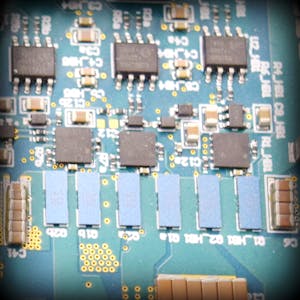How to select dc link capacitors ?
When selecting DC link capacitors, there are several factors to consider:
Voltage rating: The DC link capacitors must have a voltage rating that is higher than the maximum voltage that will be present across them. It's important to choose a capacitor with a voltage rating that is higher than the maximum voltage to ensure that the capacitor does not fail due to overvoltage.
Capacitance: The capacitance of the DC link capacitor determines the amount of energy that can be stored in it. You should choose a capacitor with a capacitance that is appropriate for your application, based on factors such as the power rating of your circuit and the desired ripple voltage.
Ripple current rating: The DC link capacitor must be able to handle the ripple current that will be present in your circuit. The ripple current is the AC component of the current that flows through the capacitor. You should choose a capacitor with a ripple current rating that is appropriate for your application, based on factors such as the power rating of your circuit and the desired ripple voltage.
ESR and ESL: The Equivalent Series Resistance (ESR) and Equivalent Series Inductance (ESL) of the capacitor can affect the performance of the circuit. ESR is the resistance of the capacitor's internal components, while ESL is the inductance of the capacitor's leads and internal components. You should choose a capacitor with low ESR and ESL to minimize losses and improve efficiency.
Temperature rating: The temperature rating of the DC link capacitor is important to ensure reliable operation over the expected temperature range of your application. You should choose a capacitor with a temperature rating that is appropriate for your application, taking into account any temperature fluctuations or heat generated by the circuit.
Size and cost: The physical size and cost of the capacitor are also important factors to consider. You should choose a capacitor that fits within the available space in your circuit and that is within your budget.
Lifetime and reliability: The expected lifetime of the capacitor is an important consideration, particularly in high-reliability applications. You should choose a capacitor with a long expected lifetime and a high level of reliability, to minimize the risk of failure and reduce maintenance requirements.
Environmental conditions: The environmental conditions in which the capacitor will be used can also affect its performance and lifetime. For example, high humidity, temperature extremes, or exposure to chemicals or radiation can all affect the performance and reliability of the capacitor. You should choose a capacitor that is appropriate for the environmental conditions in which it will be used.
Self-healing properties: DC link capacitors can be subject to voltage surges or other stresses that can cause internal damage. Self-healing capacitors are designed to recover from such damage and continue to function, whereas non-self-healing capacitors can fail catastrophically. You should consider using self-healing capacitors in your circuit to improve reliability and reduce the risk of failure.
Mounting and assembly: The mounting and assembly requirements of the capacitor are also important considerations. You should choose a capacitor with a mounting style that is compatible with your circuit design, and that can be assembled easily and reliably.
Noise and interference: DC link capacitors can generate noise and interference that can affect the performance of other components in your circuit. You should choose a capacitor with low noise and interference characteristics, and consider using shielding or other techniques to minimize the effects of noise and interference.

.png)
.png)























No comments